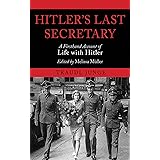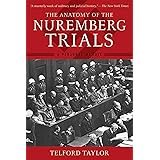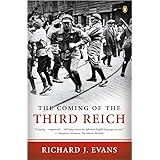
Enjoy fast, free delivery, exclusive deals, and award-winning movies & TV shows with Prime
Try Prime
and start saving today with fast, free delivery
Amazon Prime includes:
Fast, FREE Delivery is available to Prime members. To join, select "Try Amazon Prime and start saving today with Fast, FREE Delivery" below the Add to Cart button.
Amazon Prime members enjoy:- Cardmembers earn 5% Back at Amazon.com with a Prime Credit Card.
- Unlimited Free Two-Day Delivery
- Streaming of thousands of movies and TV shows with limited ads on Prime Video.
- A Kindle book to borrow for free each month - with no due dates
- Listen to over 2 million songs and hundreds of playlists
- Unlimited photo storage with anywhere access
Important: Your credit card will NOT be charged when you start your free trial or if you cancel during the trial period. If you're happy with Amazon Prime, do nothing. At the end of the free trial, your membership will automatically upgrade to a monthly membership.
Buy new:
-20% $17.65$17.65
Ships from: Amazon.com Sold by: Amazon.com
Save with Used - Acceptable
$11.69$11.69
Ships from: Amazon Sold by: Madame's Books & More

Download the free Kindle app and start reading Kindle books instantly on your smartphone, tablet, or computer - no Kindle device required.
Read instantly on your browser with Kindle for Web.
Using your mobile phone camera - scan the code below and download the Kindle app.

OK
Inside the Third Reich Paperback – April 1, 1997
Purchase options and add-ons
Speer, the Minister of Armaments and War Production under Hitler, the man who had kept Germany armed and the war machine running even after Hitler's mystique had faded, takes a brutally honest look at his role in the war effort, giving readers a complete view of the inside of the Nazi state.
- Print length672 pages
- LanguageEnglish
- PublisherSimon & Schuster
- Publication dateApril 1, 1997
- Dimensions5.5 x 1.7 x 8.25 inches
- ISBN-100684829495
- ISBN-13978-0684829494
The Amazon Book Review
Book recommendations, author interviews, editors' picks, and more. Read it now.
Frequently bought together

Similar items that may deliver to you quickly
Editorial Reviews
Amazon.com Review
Speer chronicles his entire life, but the majority of Inside the Third Reich focuses on the years between 1933 and 1945, when Speer figured prominently in Hitler's government and the German war effort as Inspector General of Buildings for the Renovation of the Federal Capital and later as Minister of Arms and Munitions. Speer's recollections of both duties foreground the impossibility of reconciling Hitler's idealistic, imperialistic ambitions with both architectural and military reality. Throughout, Inside the Third Reich remains true to its author's intentions. With compelling insight, Speer reveals many of the "premises which almost inevitably led to the disasters" of the Third Reich as well as "what comes from one man's holding unrestricted power in his hands." -- Bertina Loeffler
About the Author
Product details
- Publisher : Simon & Schuster; Reissue edition (April 1, 1997)
- Language : English
- Paperback : 672 pages
- ISBN-10 : 0684829495
- ISBN-13 : 978-0684829494
- Item Weight : 1.2 pounds
- Dimensions : 5.5 x 1.7 x 8.25 inches
- Best Sellers Rank: #99,972 in Books (See Top 100 in Books)
- #135 in German History (Books)
- #851 in World War II History (Books)
- Customer Reviews:
About the author

Discover more of the author’s books, see similar authors, read author blogs and more
Customer reviews
Customer Reviews, including Product Star Ratings help customers to learn more about the product and decide whether it is the right product for them.
To calculate the overall star rating and percentage breakdown by star, we don’t use a simple average. Instead, our system considers things like how recent a review is and if the reviewer bought the item on Amazon. It also analyzed reviews to verify trustworthiness.
Learn more how customers reviews work on AmazonReviews with images
-
Top reviews
Top reviews from the United States
There was a problem filtering reviews right now. Please try again later.
Beyond the fact that Speer was part of the nazi regime and was a key participant in events which detrimentally affected so many people, I believe what he tells.
His account sheds a new light in what being immersed in that world was like from the beginning and how gradually deteriorated until its final collapse.
I really recommend it. It was beyond interesting.
Speer’s memoirs begin by taking us on his journey from young architect to his initial contact with Hitler in 1933. Hitler’s plans for aggression. Of course, Speer was trying to distance himself from any connection to Hitler’s war-mongering, although it is implausible that he was unaware of it before September 1939. I also find it odd how Speer barely mentions his wife or children or other relatives throughout 500 pages of text; they are only mentioned in passing, but many minor Nazi party functionaries get paragraph after paragraph. Speer’s mother joined the Nazi party, but it gets but brief mention. I also thought that Speer was an established architect when he first met Hitler but in fact, he really was a novice straight out of school with virtually no paid work to his credit. Speer does point out that Hitler was genuinely popular with much of the German populace because he delivered on his early promises about the economy. The author readily admits that he fell under Hitler’s spell and became a willing follower; Hitler reciprocated by praising Speer’s rather pedestrian style and giving him various ad hoc tasks to fulfil. Speer’s only complaint in the 1930s was that the Nazis didn’t always pay him for his work but when he saw the wreckage inflicted by Kristallnacht, all he could say was that “the smashed panes of shops offended my middle class sense of order.” Speer wasn’t blind to Nazi excesses; he was a moral idiot, like so many of Hitler’s followers.
Moving into the war years, Speer makes interesting observations about Hitler’s unwillingness to put off the reconstruction of Berlin even after the war in Russia had begun. Instead, scarce resources and labor were diverted away from war production for these prestige projects, which highlights that dictatorships are not necessarily more efficient at war-making. This wastage continued until December 1941, when the defeat at Moscow finally forced some scaling-back of civilian construction programs. By this point, Speer began making a name for himself as a hard-working improviser by helping to restore the railroads in occupied Soviet territory. Indeed, he positioned himself so well that Hitler made him Minister of Armaments in 1942. Speer, in fact, was very astute about working his way upward in the Nazi hierarchy in order to gain more power and prestige for himself – just like the other Nazis were doing.
Speer does have some useful things to say about the German war effort. He says that air defense took significant resources away from production devoted to ground weaponry, but faults the Allies for not repeating attacks on damaged industrial facilities. He also notes the total mismanagement of labor resources and he points the finger at Nazi party officials for refusing to cooperate with releasing people to work in war industries. He also apportions a large share of blame to Reichsmarschall Hermann Goring, who had his fingers in everybody’s pie; Speer describes Goering as very intelligent but lazy and he managed to screw up every project that he touched. The role of the SS and Gestapo is also addressed, and it is amazing to hear that the rocket scientist Werner von Braun was arrested by the SS in 1944 for making remarks about civilian use of space. Speer’s conclusion is that the German war effort was mis-managed from the start due to personal agendas and empire-building within the Nazi hierarchy. Of course, Speer omits how any of his personal agendas and empire-building may have contributed to this mess, as well.
Speer’s rationale is weird at times, particularly when he refers to Hitler’s “magnetic power” over him and another times he claimed that Hitler “paralyzed him psychically” which of course is intended to absolve Speer of personal responsibility – he had no choice. Yet other Germans could see Hitler’s evil and were not paralyzed – why was Speer different? He lamely refers to a half-baked attempt to assassinate Hitler in 1945, but says it failed due to altered security measures. It’s clear that this non-effort, which nobody else could corroborate, was inserted to belatedly cast Speer into the ranks of those who opposed Hitler. This of course is nonsense, since Speer loyally hung in with Hitler to the end, as if he had some kind of man-crush on him; in reality, he was always looking for crumbs from Hitler’s table – praise or new authorities. Ultimately, Speer was a talented conniver who put his own ambition first and Hitler was his venue for achieving his dreams. Speer lamely concludes that, “for twelve years, I had lived thoughtlessly among murderers,” as if he was merely a house-guest.
If you are interested about the inner workings and how things started out, THIS IS THE BOOK TO READ. It's honest, factual and VERY INTERESTING. He points out the flaws, fallacies and false rhetoric that was spread throughout Germany.
(FYI: this will remind you of certain current politicians, both domestic and foreign. I will not mention who, but if you follow politics, you will have no trouble knowing who they are... and I am NOT talking about Joe Biden!..)
Top reviews from other countries
This self-serving but interesting book is in three main parts: Speer the great architect, Speer the genius of armaments production, Speer the saviour of what remained of Germany’s infrastructure. Like Coriolanus, alone he did it. A postscript could also include Speer the martyr. Through his sentence and that of others Speer claims extirpation of blame on behalf of his nation. Leaders alone atoned for the German people. Perhaps he should have demanded crucifixion by the tribunal for added symbolic effect.
There are sins of omission and commission and it is patently obvious from the narrative that Speer omits a great deal about what he really knew and felt concerning the Reich’s unsavoury aspects let alone his direct involvement. Since he claims much knowledge ex post facto (or when he does admit guilt writes that he should have known better or that he was under the Führer’s spell) he’s bound to leave much out. What he leaves in, however, is interesting, informative and readable. There are even moments of comedy such as when he was scheduled to give a speech concerning the opening of Berlin’s East-West Axis to the assembled signatories and party big-wigs. Hitler would then take over, expanding on the speech. As the much anticipated speech consisted of two very brief sentences, Hitler was caught unawares, utterly flummoxed, not knowing how to respond to such brevity.
Of particular interest to me was the effect of bombing as experienced by the Armaments Minister. Operation Gomorrah in 1943 was a real shock that, in his own words, put the fear of God in him. He reveals that the apocalyptic inferno visited upon Hamburg was precisely what the Reich had planned for London in 1940. He expresses genuine puzzlement that raids such as those on the Ruhr dams or Schweinfurt were not followed up: the damage inflicted by the Americans at Schweinfurt for example was far more significant than realised at the time. And why, after the dams were repaired at enormous cost was another small raid not repeated to smash them all over again? On a more personal note he divulges that he was transfixed by and unable to resist viewing the pyrotechnic spectacle of the Berlin raids from a flak tower: the searchlights, AA fire, masses of beautiful target indicators and parachute flares cascading down all created a scene that was compelling and unforgettable for him.
Inside the Third Reich takes the reader through the Second World War and all the Machiavellian scheming and jostling for power is laid bare. The final insane days in the Berlin bunker have always held a morbid appeal and Speer doesn’t disappoint the reader, either here or in relating the subsequent farce of the Flensburg Government and his eventual arrest.
Upper-middle-class from a prosperous Mannheim family, cultured and well-educated he clearly cut a more attractive figure than many others at the Nuremberg Trial. He also had longer than other defendants to prepare his own defence and took tranquilisers to steady his nerves when lying to the court. One thing’s for sure - he wasn’t an understudy for Truthful James. He was lucky to narrowly avoid a much-deserved hanging for his usage and organisation of slave labour in inhumane conditions. Small wonder he didn’t appeal his sentence. So, after twenty years rumination in Spandau he wrote this carefully guarded but fascinating narrative instead. After his release in 1966 he merged his memoirs with material from the Federal Archive for greater detail and authenticity.
This paperback book is well-bound, the font is clear, contains many photographs and detailed notes referring to each chapter so two bookmarks are advised.
che e' molto inconsueta. Speer e' una personalita' complessa e uno scrittore molto abile, ed e' capace di sorvolare su molti
degli aspetti piu' controversi. Dopo aver letto questo libro ho letto anche "Albert Speer, his battle with the Truth" di Gitta Sereny che cerca di dare una visione meno parziale degli eventi. In ogni caso ne consiglio vivamente la lettura.


















